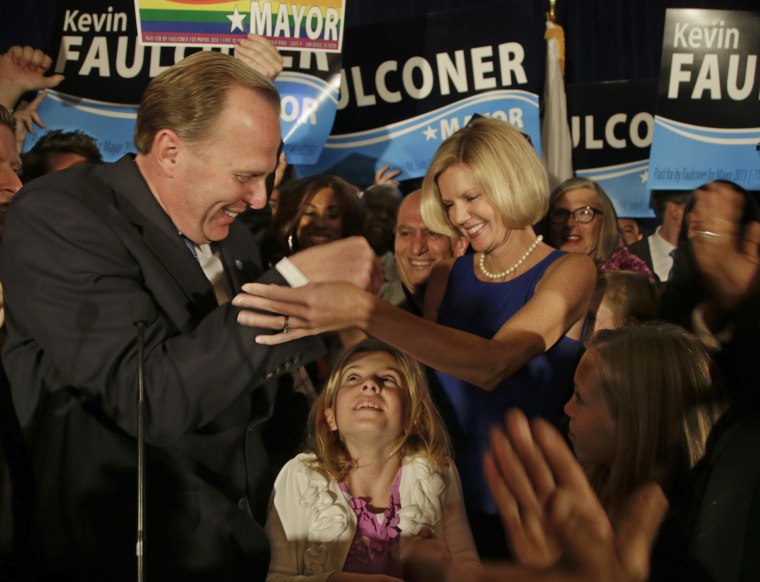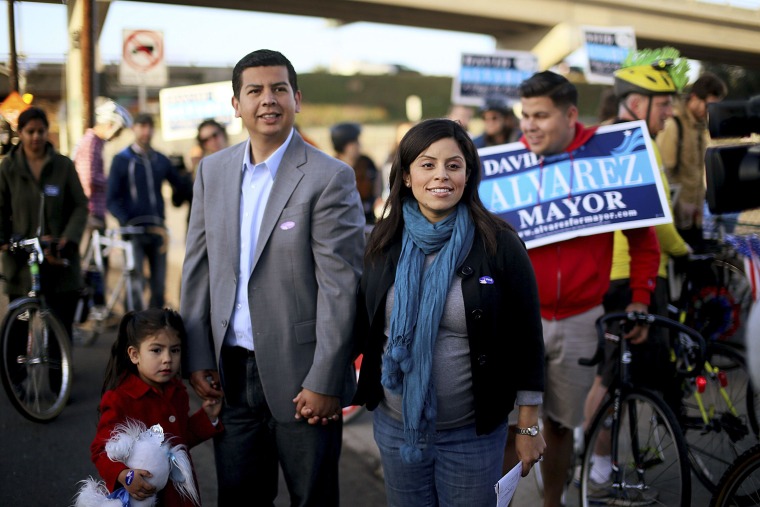The loss a week ago in San Diego's mayoral race by Democrat David Alvarez has shaken California Democrats who saw the photogenic son of Mexican immigrants as a candidate with a solid chance of holding the seat for the party.
Alvarez, a 33-year-old San Diego City Council member, lost to Republican Kevin Faulconer in the race to fill the unexpired term of Bob Filner, who stepped down last August amid allegations of sexual harassment.
Alvarez's economic adviser Rafael Castellanos is one of a cadre of young Latinos who had pinned their hopes of being part of California's future political landscape to Alvarez, who would have been the city's first Hispanic mayor. Now, like other Democrats, Castellanos is assessing the loss and thinking ahead about how to capture the state's growing Latino voters.
"In my opinion, the biggest reason for the loss was that it was a very short special election," he said.
Because the campaign was interspersed with end-of-the-year holidays, it was difficult to develop name recognition for the young Alvarez, who represents one of the poorest districts in the city on its council, Castellanos said. Faulconer is a two-term councilman and public relations executive who garnered ample business support.
The loss illustrated the greater challenges of turning out Latino voters in a year when there is no presidential race.
According to the US Census and the San Diego County Registrar of Voters, Latinos make up 29% of the population and 18% of the registered voters in the city of San Diego.
The loss illustrated the greater challenges of turning out Latino voters in a year when there is no presidential race.
An analysis of preliminary data provided by the polling firm Latino Decisions shows that the voting districts with the 25 most heavily Latino populations averaged just over a 27 percent turnout rate.
Put another way, fewer than three out of 10 potential Latino voters bothered to go to the polls. Yet in those precincts, on average 80 percent of the votes went to Alvarez.
By contrast, more than 51 percent of registered voters in voting precincts that are heavily non-Latino came out to vote last week. In these precincts, Alvarez got only 31 percent of the vote.
Republicans have been struggling to find the right recipe for victory in larger urban environments, particularly in a state like California where Democrats dominate politics at every level of government. San Diego could serve as a blueprint for the GOP in cities across the state, said Jon Cross, executive director of New Majority, a Republican-leaning political action committee.
The GOP strategy included promoting Faulconer as a moderate, and steering him away from social issues that have dogged Republican candidates, such as gay marriage, that often are toxic with more middle-of-the-road voters. Situated on the border with Mexico, many of San Diego’s Latinos and more moderate voters would have reacted negatively to extreme views on immigration, which was not part of the Faulconer campaign.
"We weren’t out there looking at social issues, we looked at how we can make our city stronger and create an atmosphere for better opportunities," Cross said. “It goes back to recruiting and supporting the right candidate for the right place."

The question is whether the GOP can sustain electoral victories in districts with higher Latino voter turnout. The mayoral race included negative advertising by a third-party Republican group against Alvarez that some suggest was racially driven - photoshopped pictures of Alvarez showed him making hand gestures that some said looked like gang signs.
Marissa Abrajano, an associate professor of political science at the University of California at San Diego, said that negative ads can drive down turnout among Latinos.
“We know from the existing research that negative ads are effective in both vote choice and turnout, and this election is perhaps an example of the latter,” Abrajano said.
President Obama publicly endorsed Alvarez, and a number of national and local unions spent millions endorsing him. But Republicans believe that the high-profile participation of labor unions hobbled the young Democrat. Ruben Barrales, the president of another Republican leaning PAC called GrowElect, says that "the overwhelming amount of union money spent on the campaign gave the average voter the impression that [Mr. Alvarez] was not independent of their influence in City Hall."
The issue, say Republicans, is for politicians like Faulconer to sustain their Latino outreach.
For now, special and local elections present targets of opportunity for the GOP.
The issue, say Republicans like Barrales, is for politicians like Faulconer to sustain their Latino outreach. “From his first press conference where he spoke in Spanish, to the last day of the campaign, Kevin reached out, communicated with, and included Latinos as part of his winning coalition."
And while Faulconer may not have had a lot of support among Latinos this time, it could establish a base for the future, Barrales said.
Meanwhile, Democrats seem undeterred and expressed hope about their chances in “on year” elections. “The Democrats should have an advantage in the regular mayoral election going forward," said Castellanos.
